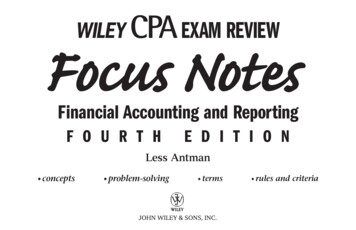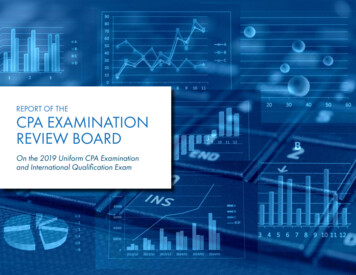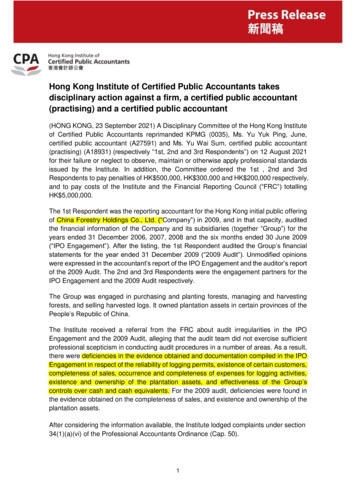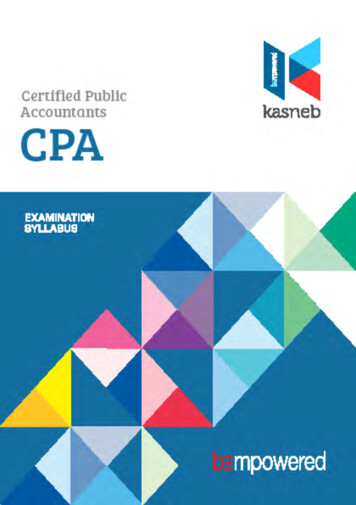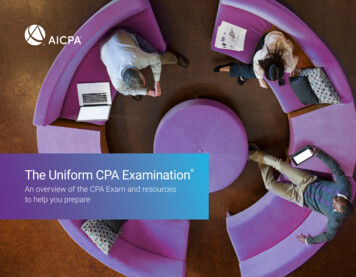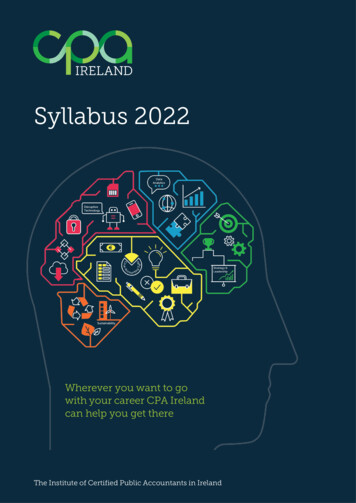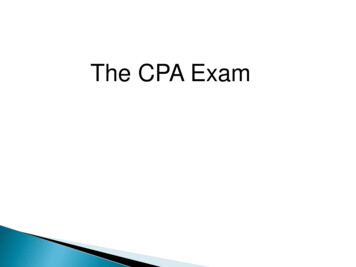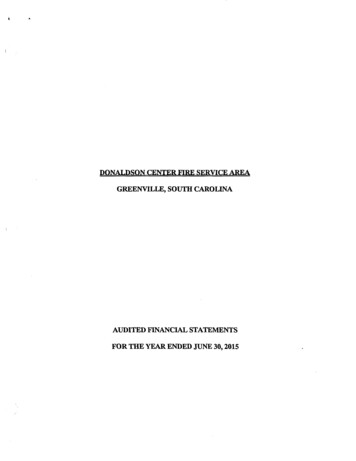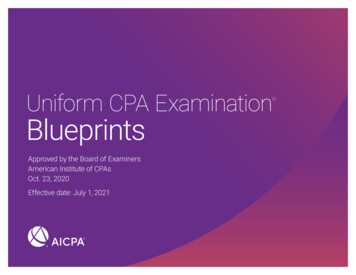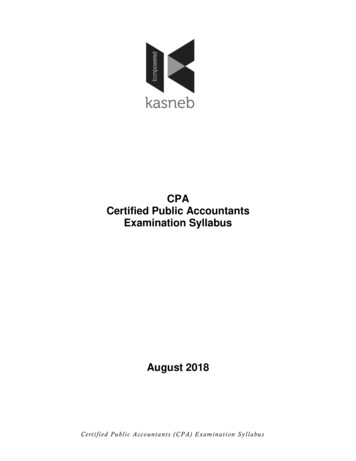
Transcription
CPACertified Public AccountantsExamination SyllabusAugust 2018Certified Public Accountants (CPA) Examination Syllabus
TABLE OF CONTENTSPage1.0Background Information abouti2.0Examinations ofiii3.0Examination Rules and Regulationsvii4.0Summary of the CPA Examination SyllabusxiiPART ISection 1Paper No. 1Financial Accounting1Paper No. 2Business Law4Paper No. 3Entrepreneurship and Communication7Paper No. 4Economics10Paper No. 5Management Accounting15Paper No. 6Public Finance and Taxation18Paper No. 7Company Law21Paper No. 8Financial Management24Paper No. 9Financial Reporting28Paper No. 10Auditing and Assurance30Paper No. 11Management Information Systems33Paper No. 12Quantitative Analysis36Section 2PART IISection 3Section 4Certified Public Accountants (CPA) Examination Syllabus
PART IIISection 5Paper No. 13Strategy, Governance and Ethics40Paper No. 14Advanced Management Accounting43Paper No. 15Advanced Financial Management45Paper No. 16Advanced Public Finance and Taxation49Paper No. 17Advanced Auditing and Assurance52Paper No. 18Advanced Financial Reporting54Section 6Certified Public Accountants (CPA) Examination Syllabus
1.0BACKGROUND INFORMATION ABOUT kasneb1.1Historical Background of kasnebThe history of kasneb dates back to 1964, immediately after Kenya attainedindependence. At that time, the Government identified a number of policyobjectives, which took cognisance of the fact that:1.21.1.1In order for a country to develop, it was necessary to create a pool of trainedpersonnel in the various fields of national economy;1.1.2The right direction had been taken in other fields such as medicine, agriculture,law and engineering and it was also a natural corollary that professions ofaccounting, finance, administration and management should follow suit;1.1.3Although the people of Kenya had benefited greatly from training in foreigncountries, it was obvious that other countries could not afford to place unlimitedfacilities for training of foreign personnel, nor could Kenya rely entirely on othercountries for the training of her personnel.Legal Foundation and Status of kasnebkasneb was established as a state corporation under the National Treasury by theGovernment of Kenya on 24 July 1969. The establishment and operations of kasneb aregoverned by the following main Acts:1.3(a)The Accountants Act, No. 15 of 2008 (which repealed the Accountants Act,Cap 531 of 1977).(b)The Certified Public Secretaries of Kenya Act, Cap 534 of 1988.(c)The Investment and Financial Analysts Act, No. 13 of 2015.Partner Institutions1.3.1Institute of Certified Public Accountants of Kenya (ICPAK)ICPAK is established under Section 3 of the Accountants Act, No.15 of 2008.One of the functions of ICPAK is to advise kasneb on matters relating toexamination standards and policies. The Act also makes provisions for theestablishment of a Registration and Quality Assurance Committee (RegistrationCommittee) under Section 13. One of the functions of Registration Committeeis to register eligible persons as Certified Public Accountants.1.3.2Institute of Certified Secretaries (ICS)ICS is established under Section 3 of the Certified Public Secretaries of KenyaAct (Cap. 534) of the Laws of Kenya. One of the functions of ICS is to advisekasneb on matters relating to examination standards and policies.Certified Public Accountants (CPA) Examination Syllabus – July 2018-i-
1.3.3Registration of Certified Public Secretaries Board (RCPSB)RCPSB is established under Section 11 of the Certified Public Secretaries ofKenya Act (Cap. 534) of the Laws of Kenya. One of the functions of RCPSB isto register eligible persons as Certified Secretaries.1.3.4Institute of Certified Investment and Financial Analysts (ICIFA)ICIFA is registered under the Investment and Financial Analysts Act, No. 13 of2015 of the Laws of Kenya. One of the functions of ICIFA is to advise kasnebon matters relating to examination standards and policies. The Act also makesprovisions for the establishment of a Registration Committee under Section 13.One of the functions of the Registration Committee is to register eligiblepersons as Certified Investment and Financial Analysts.1.3.5Institute of Credit Management Kenya [ICM (K)]ICM (K) is registered under the Societies Act, (Cap.108) of the Laws of Kenya.1.4Functions of kasnebSection 17(1) of the Accountants Act, 2008 of the Laws of Kenya defines the functions ofkasneb. These functions are:(a)To prepare syllabuses for professional, diploma and certificate examinations inaccountancy, company secretarial practice and related disciplines;(b)To make rules with respect to such examinations;(c)To arrange and conduct examinations and issue certificates to candidates whohave satisfied examination requirements;(d)To promote recognition of its examinations in foreign countries;(e)To investigate and determine cases involving indiscipline by students registeredwith the Examinations Board;(f)To promote and carry out research relating to its examinations;(g)To promote the publication of books and other materials relevant to itsexaminations;(h)To liaise with the Ministry of Education, Science and Technology in accreditationof institutions offering training in subjects examinable by the Examinations Board,and(i)To do anything incidental or conducive to the performance of any of thepreceding functions.Certified Public Accountants (CPA) Examination Syllabus – July 2018- ii -
2.0EXAMINATIONS OF kasnebkasneb offers the following examinations:2.0.1Certificate in Accounting and Management Skills (CAMS) Examination; forpersons who wish to qualify and work as entry level accounting and managementpersonnel in small and medium enterprises, non-governmental organisations(NGOs), public sector entities and related areas.2.0.2Certified Public Accountants (CPA) Examination; for persons who wish toqualify and work or practice as professional accountants, auditors, financemanagers, tax managers and consultants in related areas in both public andprivate sectors.2.0.3Certified Secretaries (CS) Examination; for persons who wish to qualify andwork or practice as corporate secretaries, administrators at county and nationallevels and consultants in governance, compliance, business management andrelated areas in both public and private sectors.2.0.4Certified Information Communication Technologists (CICT) Examination;for persons who wish to qualify and work or practice as information andcommunication technology (ICT) professionals in various areas includingsystems development, programming, database management, networkadministration, mobile applications and software engineering.2.0.5Certified Investment and Financial Analysts (CIFA) Examination; for personswho wish to qualify and work or practice as investment and securities analysts,financial analysts, portfolio managers, investment bankers, fund managers andrelated specialisations.2.0.6Certified Credit Professionals (CCP) Examination; for persons who wish toqualify and work or practice in various fields of credit management includingcredit analysis, debt management and recovery, corporate lending and relatedareas in both formal and informal sectors.2.0.7Accounting Technicians Diploma (ATD) Examination; for persons who wishto qualify and work as middle level accountants providing technical support toprofessional accountants, auditors, tax practitioners and related areas.2.0.8Diploma in Information Communication Technology (DICT) Examination; forpersons who wish to qualify and work as technical support personnel in computerapplications, systems development, programming, networking and other ICTrelated areas.2.0.9Diploma in Credit Management (DCM) Examination; for persons who wish toqualify and work as middle level credit managers, credit assessors and otherrelated areas in both formal and informal sectors.2.0.10 Examination for holders of foreign accountancy qualifications (FAQs)In consultation with the Council of ICPAK under Section 26 Sub-Sections (2) and(3) of the Accountants Act, 2008, kasneb examines holders of foreignaccountancy qualifications who have applied for registration as Certified PublicAccountants (CPAs) of Kenya and they are required to demonstrate theirknowledge of local law and practice.Certified Public Accountants (CPA) Examination Syllabus – July 2018- iii -
2.0.11 Examination for holders of foreign secretaries qualifications (FSQs)In consultation with the Council of ICS under Section 20 Sub-Sections (2) and (3)of the Certified Public Secretaries of Kenya Act, Cap 534, kasneb examinesholders of foreign secretaries qualifications who have applied for registration asCertified Secretaries (CSs) of Kenya and they are required to demonstrate theirknowledge of local law and practice.2.0.12 Examination for holders of foreign investment and financial analystsqualifications (FIFAQs)In consultation with the Council of ICIFA under Section 16 Sub-Sections (2) and(3) of the Investment and Financial Analysts Act, No. 13 of 2015, kasnebexamines holders of foreign qualifications who have applied for registration asCertified Investment and Financial Analysts (CIFA) and they are required todemonstrate their knowledge of local law and practice.2.1 Aims and Objectives of the Examinations of kasnebThe aims and objectives of the examinations of kasneb are to produce:(a)Qualified accountants, auditors and tax practitioners with competency to present,analyse and interpret financial information for both public and private sectorentities in oral and written forms.(b)Qualified corporate secretaries capable of advising on matters relating tocorporate secretarial practice, governance, ethics, compliance and administrationincluding at national and county levels.(c)Information communication technology professionals who are capable of designing,developing, implementing, maintaining and safeguarding modern information systems.(d)Competent professionals with the ability to analyse and advise on mattersrelating to investments, securities and other areas of finance.(e)Competent professionals who are able to make sound decisions in creditmanagement in both formal and informal sectors.(f)Qualified managers with the ability to make sound managerial decisions.(g)Professionals who uphold high ethical standards and professional values in thedischarge of their duties.(h)Professionals who are creative, innovative and able to communicate effectivelyand to adapt to the dynamic environment both in the public and private sectors.2.2 The Certified Public Accountants (CPA) ExaminationThe CPA Examination is held twice yearly in May/June and November/December. Theexamination is divided into three parts of two sections each. Each section consists ofthree papers. A candidate may attempt two sections in a part together or separately inascending order but before proceeding to the next part, a candidate must pass thelower part.The examination is rigorous and standards are high and therefore a candidate isadvised to devote approximately the equivalent of twelve months of full time study foreach part of the examination. Ideally, a student should be able to complete the CPAexamination in a period not exceeding three years.Certified Public Accountants (CPA) Examination Syllabus – July 2018- iv -
The CPA examination is benchmarked on the international standards promulgated byInternational Accounting Education Standards Board (IAESB), International AccountingStandards Board (IASB), International Auditing and Assurance Standards Board(IAASB) and International Public Sector Accounting Standards Board (IPSASB). TheCPA examination therefore meets the requirements of International Education Standards(IESs), International Financial Reporting Standards (IFRSs), International Standards onAuditing (ISAs) and International Public Sector Accounting Standards (IPSASs).The IESs prescribe requirements relating to entry, professional training and practice asrequired by International Federation of Accountants (IFAC) for the qualificationprogramme for professional accountants.2.2.1 The Trainee Accountants Practical Experience Framework (TAPEF)The TAPEF is a joint kasneb-ICPAK initiative for compliance with the requirementsof IES 5 on practical experience requirements for trainee (student) accountants.Students taking the CPA examination are required to acquiring practicalexperience so that they can match progress in examination with competence inperformance of duties in the work environment. IES 5 requires practical experienceto be part of the pre-qualification programme. The minimum period of experiencerequired is three years. The practical experience may be gained during or after thequalification process.All CPA students are therefore required to register for TAPEF through the ICPAKwebsite www.icpak.com. Upon completing the CPA examination and obtaining therequisite practical experience, the graduates are eligible to register with theInstitute of Certified Public Accountants of Kenya (ICPAK) as full members in orderto be recognised as professional accountants and use the CPA designation. CPAgraduates without the requisite experience are eligible to be registered with ICPAKas associate members pending their acquisition of experience and registration asfull members.Further details on the TAPEF are available on the kasneb and ICPAK websites.2.2.2 Aims of CPA ExaminationThe aims of CPA Examination include to:(a) Produce a professional accountant with up-to-date and advanced knowledgein the areas of accounting, taxation, auditing and assurance and financialmanagement as applicable in both the public and private sectors.(b) Impart professional values and ethics, communication skills, creativity,innovation and ability to generate new ideas.(c) Provide a basis for the application of advanced knowledge inand cognate subjects to different situations.accountingCertified Public Accountants (CPA) Examination Syllabus – July 2018-v-
2.2.3 Aims of CPA Part I ExaminationThe aims of CPA Part I examination include to:(a)Produce an accountant who understands the principles relating tofinancial and management accounting, commercial law, economics, publicfinance and taxation.(b)Provide a basis for the accountant to apply the acquired knowledge toundertake the following, among other responsibilities:(c)2.2.4 Prepare and analyse basic financial statements Analyse costs and variances Compute tax for non-complex entities Apply general principles of commercial law Manage non-complex public financial management issuesProvide a basis for the accountant to advance to the next level of the CPAexamination.Aims of CPA Part II ExaminationThe aims of CPA Part II examination include to:(a)Produce an accountant who understands financial reporting, financialmanagement, auditing and related disciplines.(b)Provide a basis for the accountant to apply the acquired knowledge toundertake the following, among other responsibilities: (c)2.2.5Prepare group accountsEvaluate various investment decision scenariosComply with legal principles governing companiesExecute an audit assignmentApply operation research techniques in decision makingProvide a basis for the accountant to advance to the next level of the CPAexamination.Aims of CPA Part III ExaminationThe aims of CPA Part III examination include to:(a)Produce a high calibre professional accountant with an in-depthunderstanding of advanced financial reporting, advanced financialmanagement, advanced taxation, advanced auditing and assurance andrelated disciplines.(b)Provide a basis for the accountant to apply the acquired knowledge toundertake the following, among other responsibilities: Account for complex accounting transactionsUndertake forensic auditsCompute tax for complex aspects of companies and specialisedentities Design an optimal capital structure for an organisationCertified Public Accountants (CPA) Examination Syllabus – July 2018- vi -
(c)Apply financial and non-financial indicators to measure organisationalperformancePractice the tenets and principles of good governanceEnsure the professional is competent to be registered as a Certified PublicAccountant of Kenya with high regard to professional values and ethicsdemanded of a professional accountant.3.0EXAMINATION RULES AND REGULATIONS3.1Registration RequirementsA person seeking to be registered as a student for the CPA examination must showevidence of being a holder of one of the following qualifications:3.1.1Kenya Certificate of Secondary Education (KCSE) examination with anaggregate average of at least grade C plus (C ).3.1.2kasneb technician, diploma or professional examination certificate.3.1.3A degree from a recognised university.3.1.4Such other certificates or diplomas as may be approved by kasneb.Persons intending to take the November/December examinations must register asstudents not later than 15 September while those intending to take the May/Juneexaminations must register as students not later than 15 March.kasneb reserves the right to refuse to register any applicant who in its opinion is not fitand proper to be registered as a student. Similarly, kasneb reserves the right to cancelthe registration of any student who in its opinion is not fit and proper to be a student ofkasneb.3.2.ExemptionsExemptions may, on application, be granted to registered students who are holders ofcertain degrees and diplomas recognised by kasneb. Exemptions will be granted on apaper by paper basis.3.3Retention of CreditsThere are six sections in the CPA examination. Each section has three papers. Paperstaken and passed in a section shall be retained as credits for the candidate provided thatthe candidate fulfils the requirements set out below:3.3.1The candidate must enter and attempt all the papers in a section unless thecandidate is exempted from some papers in the section or has earned credits inprevious attempts.3.3.2A candidate who is awarded one or two credits in a section must enter and passthe failed paper(s) in the section within two and a half (21/2) years or five (5)consecutive sittings failure to which the candidate will be required to resit all thepapers in the section.Certified Public Accountants (CPA) Examination Syllabus – July 2018- vii -
3.4.3.5.Progression Rule3.4.1A candidate must attempt and pass the CPA Part I examination beforeproceeding to the CPA Part II examination.3.4.2A candidate must attempt and pass the CPA Part II examination beforeproceeding to the CPA Part III examination.3.4.3A candidate will not be allowed to enter a higher section in a part beforecompleting the lower section unless the candidate has been referred in thehigher section or has entered the two sections simultaneously.Duration of Registration as a Student of kasneb3.5.13.5.2A registered student of the CPA examination will be required to complete theexamination within a period of nine years provided that the candidate shallcomplete:3.5.1.1The CPA Part I examination by the end of the third year sinceregistration.3.5.1.2The CPA Part II examination by the end of the sixth year sinceregistration.3.5.1.3The CPA Part III examination by the end of the ninth year sinceregistration.kasneb reserves the right to cancel the registration of a student who fails tocomplete the examination within the stipulated time. A student whoseregistration is cancelled under the rules in this paragraph may not be eligiblefor re-registration.However, kasneb reserves the right to vary or amend the regulations.3.6.Registration Renewal3.6.1A registered student must renew the studentship registration annually on thefirst day of July provided that newly registered students will be required torenew their registration on the first day of July following the examination sittingto which they are first eligible to enter.3.6.2A student who without good cause fails to renew the registration within threemonths of the renewal date will be deemed to have allowed the registration tolapse and may thus forfeit the right to write the examination until the renewalposition is regularised. The registration number of a student who fails to renewthe registration for three consecutive years will be deactivated, that is, removedfrom the register of students and will thus not be able to book for examinationsuntil the registration number is reactivated.3.6.3A student whose registration number is deactivated for failure to renew theregistration may apply for reactivation provided that if the application isaccepted, the student shall:(a)Pay the registration reactivation fee.(b)Pay three years of registration renewal fees.Certified Public Accountants (CPA) Examination Syllabus – July 2018- viii -
3.7.Examination EntriesExamination entries, which must be on the prescribed forms, are accepted fromregistered students only. The closing date for the receipt of entries for theNovember/December examinations is 15 September and for the May/Juneexaminations, the 15 March.3.8Rules Governing the Conduct of Students in the Examination Room3.8.1Candidates should present themselves for the examination at least30 minutes before the scheduled time for the commencement of theexamination they are taking.3.8.2A candidate who arrives half an hour or later after the commencement of theexamination will not be allowed to take the examination nor will a candidate bepermitted to leave the examination room until after the end of the first half hoursince the commencement of the examination.3.8.3Each candidate is assigned a registration number upon registration as a student ofkasneb. The candidate must sit at the place indicated by that number in theexamination room. The registration number must be entered in the space providedat the top right hand corner of each answer sheet.3.8.4The name of the candidate must not appear anywhere on the answer sheet.3.8.5Each answer sheet has a serial number indicated on the top, left hand side of theanswer sheet. Each candidate must indicate the serial number of the answersheet(s) used for each examination paper in the signature register.3.8.6Examination stationery will be provided in the examination room, but candidatesmust bring their own blue or black ink pens, pencils, and rulers.3.8.7Mobile phones are strictly not allowed in the examinations room.3.8.8No stationery whatsoever may be removed from the examination room.3.8.9Candidates must not carry the examination question papers from theexamination room.3.8.10 Candidates are allowed to use calculators provided that such calculators arenoiseless, cordless and non-programmable.3.8.11 Candidates will be required to positively identify themselves to the chiefinvigilator by producing their student identification cards and the national identitycards. Non-Kenyan candidates will be required to produce other relevantidentification documents such as passports.3.8.12 Strict silence must be observed during the entire duration of the examination.3.8.13 Candidates must not possess any notes, printed paper or books in theexamination room, but must leave any such material with the chief invigilator.Candidates using clipboards must ensure that such clipboards have no writing onthem whatsoever.3.8.14 Smoking is not allowed in the examination room.Certified Public Accountants (CPA) Examination Syllabus – July 2018- ix -
3.8.15 Candidates must not collude in the examination room by exchanging notes orkeeping the answer booklet in such a way that another candidate can read orcopy from the booklet.3.8.16 Impersonation in the examination room is not only a serious offence but also acriminal offence.3.8.17 During the course of the examination, no candidate may leave the examinationroom without permission from the chief invigilator. Any candidate who does sowill not be allowed to return to the examination room.3.8.18 Candidates who finish the paper before the chief invigilator announces the end ofthe examination and wish to leave the examination room while the examination isin progress must inform the invigilator and hand in their scripts to the invigilatorbefore leaving the examination room. However, no candidate will be allowed toleave the examinations room during the last fifteen (15) minutes of theexamination.3.8.19 Candidates must not leave the examination room with any answer booklet oranswer sheets.3.8.20 Candidates must not leave the examination room before their answer bookletsare collected by the invigilators.3.8.21 Candidates must not write notes on the examination timetable (Authority to sitthe Examination).3.8.22 Candidates with confirmed disabilities may apply to kasneb to be allowed extratime during examinations. Such application should be made at least two monthsprior to the examination.3.8.23 Candidates must produce the timetables (Authority to sit the Examination) inorder to be allowed to take the examination. Candidates may download theirtimetables (Authority to sit the Examination) from the kasneb website. Thedownloaded timetables may be used as authority to sit the examination.3.9Action for Breach of Examination Rules and Regulations3.9.1kasneb is mandated by the Accountants Act, 2008 under Section 17 (1)(e) toinvestigate and determine cases involving indiscipline by students registered withkasneb. Section 42 of the Act further defines examination offences that arepunishable under the law and the applicable penalties.3.9.2 Disciplinary action will be taken against candidates who breach the examinationrules and regulations of kasneb. A breach of the examination rules andregulations of kasneb shall include but is not limited to the following:(a)Deficiency in ssession of a mobile phone in the examination room.(e)(f)Possession of notes in the examination room.Taking away answer booklets.(g)Writing of names on the scripts.(h)Possession of mobile phones in the examination room.(i)Carrying the examination question papers from the examination room.Certified Public Accountants (CPA) Examination Syllabus – July 2018-x-
3.9.33.9.4The action for breach of the examination rules and regulations of kasneb shallinclude but not limited to the following:(a)De-registration as a student of kasneb.(b)Cancellation of registration number.(c)Nullification of candidate’s results.(d)Prohibition from taking examinations of kasneb.(e)Written reprimand and warning.Certain breaches of the rules and regulations amount to breaches of the law.In such cases, candidates will be handed over to the police for investigations andappropriate legal action.Section 42 of the Accountants Act, 2008 provides that a person who:(a)gains access to examinations materials and knowingly reveals thecontents, whether orally, in writing or through any other form, to anunauthorised party, whether a candidate or not;(b)wilfully and maliciously damages examinations materials;(c)while not registered to take a particular examination, with intent toimpersonate, presents or attempts to present himself to take the part ofan enrolled candidate;(d)presents a forged certificate to a prospective employer or to an institutionof learning with intent to gain employment or admission; or(e)introduces unauthorised materials into the examinations room, whether inwriting or in any other form, whether a candidate or not, commits anoffence and is liable on conviction to imprisonment for a term notexceeding three years, or to a fine not exceeding one hundred thousandshillings, or to both.Certified Public Accountants (CPA) Examination Syllabus – July 2018- xi -
4.0SUMMARY OF THE CERTIFIED PUBLIC ACCOUNTANTS (CPA) EXAMINATIONSYLLABUSPart ISection 1Paper No. 1Financial AccountingPaper No. 2Business LawPaper No. 3Entrepreneurship and CommunicationSection 2Paper No. 4EconomicsPaper No. 5Management AccountingPaper No. 6Public Finance and TaxationPart IISection 3Paper No. 7Company LawPaper No. 8Financial ManagementPaper No. 9Financial ReportingSection 4Paper No. 10Auditing and AssurancePaper No. 11Management Information SystemsPaper No. 12Quantitative AnalysisPart IIISection 5Paper No. 13Strategy, Governance and EthicsPaper No. 14Advanced Management AccountingPaper No.15Advanced Financial ManagementSection 6Paper No. 16Advanced Public Finance and TaxationPaper No. 17Advanced Auditing and AssurancePaper No. 18Advanced Financial ReportingCertified Public Accountants (CPA) Examination Syllabus – July 2018- xii -
PART ISECTION 1PAPER NO.1 FINANCIAL ACCOUNTINGGENERAL OBJECTIVEThis paper is intended to equip the candidate with knowledge, skills and attitudes thatwill enable him/her to prepare financial statements for different entities.1.0LEARNING OUTCOMESA candidate who passes this paper should be able to: Prepare books of original entry and basic ledger accounts under doubleentry system Prepare basic financial statements of sole traders, partnerships,companies, manufacturing entities and not for profit organisations Comply with the regulatory framework in the accounting field Account for assets and liabilities Analyse financial statements by use of ratios and statement of cash flows.CONTENT1.1Introduction to accountingThe nature and purpose of accountingObjectives of accountingUsers of accounting information and their respective needsThe accounting equationRegulatory framework of accounting (regulatory bodies such as ICPAK,IFAC, IASB, IPSASB, IAESB)Accounting standards (IASs/IFRSs) (importance and limitations)Professional ethicsAccounting concepts/principlesQualities of useful accounting information1.2Recording transactionsSource documents: quotations, purchase orders, statement of account,remittance advice, receipts, petty cash vouchers, sales and purchaseinvoice, credit notes and debit notes, bank statementsBooks of original entry: sales journal, purchases journal, returns inwardsjournal, returns outward journal, cash book, petty cash book and generaljournalDouble entry and the ledger; use of T- accounts and double entry aspects(debit and credit), sales ledger and purchases ledgerThe trial balanceComputerised accounting sys
Certified Public Accountants (CPA) Examination Syllabus TABLE OF CONTENTS Page 1.0 Background Information about i 2.0 Examinations of iii 3.0 Examination Rules and Regulations vii 4.0 Summary of the CPA Examination Syllabus xii PART I Section 1 Paper No. 1 Financial Accounting 1
